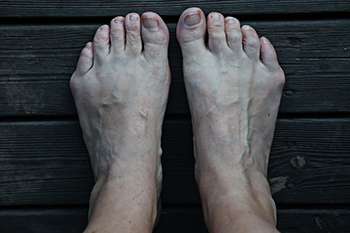 A bunionette, also called a tailor’s bunion, is a bony outgrowth along the outside of the foot, at the base of the pinky toe. Bunionettes are thought to form due to inherited mechanical structure defects in the foot. When the area at the base of the pinky toe is put under excessive pressure and friction, usually from wearing shoes that are too narrow and rub against the toe, a bony outgrowth develops in this area. This deformity grows outwards and pushes the pinky toe inwards, toward the other toes. Bunionettes cause symptoms such as redness, swelling, and pain at the site of the bunionette, as well as a visible foot deformity that can make it difficult to wear certain types of shoes. If you have a painful bunionette, please seek the care of a podiatrist.
A bunionette, also called a tailor’s bunion, is a bony outgrowth along the outside of the foot, at the base of the pinky toe. Bunionettes are thought to form due to inherited mechanical structure defects in the foot. When the area at the base of the pinky toe is put under excessive pressure and friction, usually from wearing shoes that are too narrow and rub against the toe, a bony outgrowth develops in this area. This deformity grows outwards and pushes the pinky toe inwards, toward the other toes. Bunionettes cause symptoms such as redness, swelling, and pain at the site of the bunionette, as well as a visible foot deformity that can make it difficult to wear certain types of shoes. If you have a painful bunionette, please seek the care of a podiatrist.
If you are suffering from bunion pain, contact Dr. Richard T. Bauer of Summit Foot & Ankle. Our doctor can provide the care you need to keep you pain-free and on your feet.
What Is a Bunion?
Bunions are painful bony bumps that usually develop on the inside of the foot at the joint of the big toe. As the deformity increases over time, it may become painful to walk and wear shoes. Women are more likely to exacerbate existing bunions since they often wear tight, narrow shoes that shift their toes together. Bunion pain can be relieved by wearing wider shoes with enough room for the toes.
Causes
- Genetics – some people inherit feet that are more prone to bunion development
- Inflammatory Conditions - rheumatoid arthritis and polio may cause bunion development
Symptoms
- Redness and inflammation
- Pain and tenderness
- Callus or corns on the bump
- Restricted motion in the big toe
In order to diagnose your bunion, your podiatrist may ask about your medical history, symptoms, and general health. Your doctor might also order an x-ray to take a closer look at your feet. Nonsurgical treatment options include orthotics, padding, icing, changes in footwear, and medication. If nonsurgical treatments don’t alleviate your bunion pain, surgery may be necessary.
If you have any questions, please feel free to contact our office located in Latham, NY . We offer the newest diagnostic and treatment technologies for all your foot care needs.
